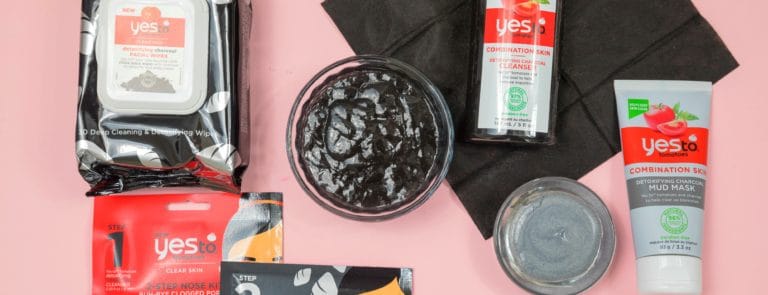15% off €25
Code:EXTRA
Acne: 4 spot-fighting ingredients

Baffled by the shelves full of acne skincare? A Holland & Barrett nutritionist puts 4 spot-fighting ingredients in the spotlight. Are any of these in your acne cream?
Summary
1What is acne caused by?
Acne flares up when your pores and hair follicles get congested with an oily substance called sebum.
2What triggers acne to flare up?
Puberty, pregnancy, menstrual cycle, certain medications, cosmetic products and many more factors.
3Acne care
For mild to moderate acne, there are a multitude of over-the-counter remedies.
Holland & Barrett nutritionist, Emily Rollason, shares some hard-working ingredients to look out for in your acne creams.
Nowadays, we’re making more informed and responsible choices when selecting skincare. This includes acne creams.
If you’re interested in vegan-friendly formulations or supporting the clean beauty movement, you’re likely to be seeking more information on what’s in skincare products. You may also be intrigued by single-ingredient alternatives.
In this post, we focus on four key ingredients and how they can help with acne. But before we jump into our spot-fighting superheroes, let’s talk acne basics.
What is acne caused by?
First of all, it’s a common skin condition. In fact, it’s estimated that 95% of people aged 11 to 30 suffer with acne of some kind1. It presents itself in a few ways.
They all have two things in common – acne is troublesome to get rid of and universally unwelcome.
Acne is best known for causing various types of spots. Blackheads, whiteheads, red spots, pus-filled pimples and cysts are common variations. But oily skin and skin that’s painful and hot to touch are often extra aggravations.
What causes acne? You can blame blocked pores and hair follicles for your spots. In very simple terms, acne flares up when your pores and hair follicles get congested with an oily substance called sebum.
Sebum is produced by the sebaceous glands attached to follicles. Whilst this oil is great at stopping your hair drying out, when there's too much, it mixes with dead skin cells and blocks the follicle. This leads spots to form, and acne to develop.
What triggers acne to flare up?
Lots of things cause your sebaceous glands to go into oil-producing overdrive.
Puberty, pregnancy, menstrual cycle, certain medications, cosmetic products and many more factors. It’s certainly true that hormones have a big role to play in ramping up the oil building up under your skin.
But equally, there are little things you do every day, that could be making you more susceptible to a flare up of spots too. For example, it could be something as simple as a headband putting pressure persistently on the same area of skin.
With so many factors contributing to the development of spots, you can see why the question of how to get rid of acne is tricky.
There are no shortage of acne creams and spot treatments on the market, which only adds to the problem. The question is, what makes these creams work?
Acne care
First of all, there are a whole range of acne creams and skincare available. For mild to moderate acne, there are a multitude of over-the-counter remedies. In addition, prescription creams and medication are effective options for more severe cases.
There are three main ways acne skincare can help you to maintain a clearer complexion:
- Dissolve excess oil to prevent the clogging of follicles
- Exfoliate the surface of the skin to prevent old cells from clogging up pores
- Reduce swelling and redness to improve the appearance of skin
Four common super-ingredients in skincare for acne-prone skin
Are you looking to understand the ingredients panel on you acne skincare? Here we highlight four ingredients you’re likely to come across.
1. Salicylic acid
Salicylic acid is a beta hydroxy acid (it sometimes goes under the name BHA too). It has many highly regarded acne-fighting properties.
Firstly, it exfoliates the surface of the skin to remove dead skin and uncover new, brighter skin. It also works a lot deeper too, dissolving the skin debris and oil lurking under your skin.
Nutritionist, Emily Rollason says: “As well as unclogging pores, salicylic acid has some anti-inflammatory properties. This may help to reduce the swelling and redness that often come with acne.”
2. Tea tree oil
Tea tree oil originates from a native Australian plant called the melaleuca alternifolia. You've probably heard of it already as it's a well-known natural ingredient used in skincare for acne.
Boasting anti-bacterial and antiseptic properties, it not only helps to clear congested skin, but also reduces redness too. All in all, this plant-derived ingredient has strong credentials as an ingredient in acne skincare.
Nutritionist, Emily Rollason says: “Tea tree oil might be natural, but it’s properties have been studied for several years. Particularly when it comes to reducing inflamed red spots. If you’re looking for an essential oil to aid with an outbreak, this is the one.”
3. Willow bark
Willow bark is full of skin-boosting vitamins and minerals that are great for clearing up spots and soothing irritation. Most significantly, it’s a natural, botanical source of salicylic acid.
This means it dissolves oily sebum and dead skin cells that are clogging up your pores. Meanwhile on the surface, its exfoliating properties get to work on shrinking the appearance of pores.
Nutritionist, Emily Rollason says: “Willow bark is generally gentle on skin. So, as well as being a great all-rounder in acne skincare, it’s also safe for most skin types."
4. Neem extract
Neem is a powerful antibacterial herb and an effective, natural, plant-based acne skincare ingredient (just make sure you choose neem extract and not neem oil which can be an irritant.)
Neem extract offers skin-calming benefits, and as an antioxidant, it decreases harmful microbes harbouring on your skin’s surface. Also look out for melia azadirachta, as it's sometimes listed by its Latin name in ingredients.
Nutritionist, Emily Rollason says: “Neem extract contains polysaccharides which can aid with increasing skin hydration. This may enhance the appearance of skin.”
A consistent skincare routine
The key to giving these ingredients the chance to work on your acne is consistency. So, once you have these products in your cupboards, think about how you can use them best in your skincare routine. And then, most importantly, stick to it.
Last updated: 3 April 2020
Emily Rollason is a qualified Nutritional Therapist, achieving a Diploma from the Institute for Optimum Nutrition. Working with Holland & Barrett for six years, Emily has valuable experience working on a one-to-one basis with clients with a variety of health concerns such as endometriosis, adenomyosis and aiding those looking to support certain dietary requirements, such as a vegan or vegetarian diet. Emily has a long history of working with customers to guide them on what products are best suited to help them with their ailments. Her particular interests in nutrition and wellness focus around digestive health, female health and allergies/ intolerances.



